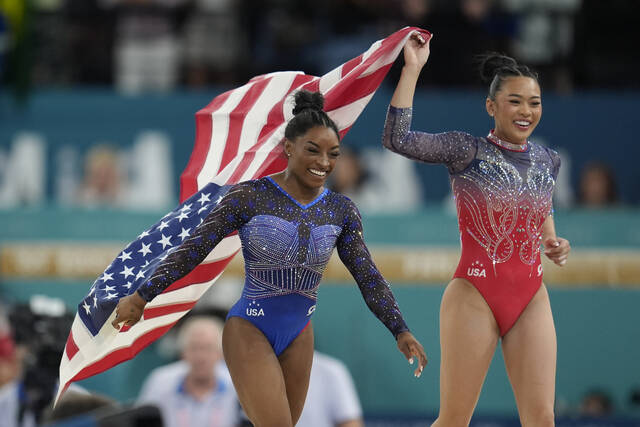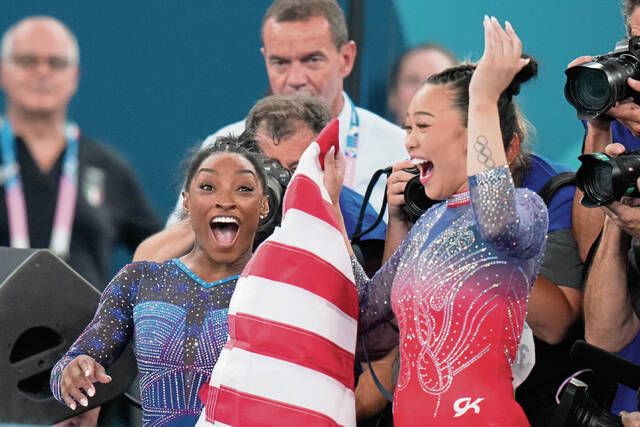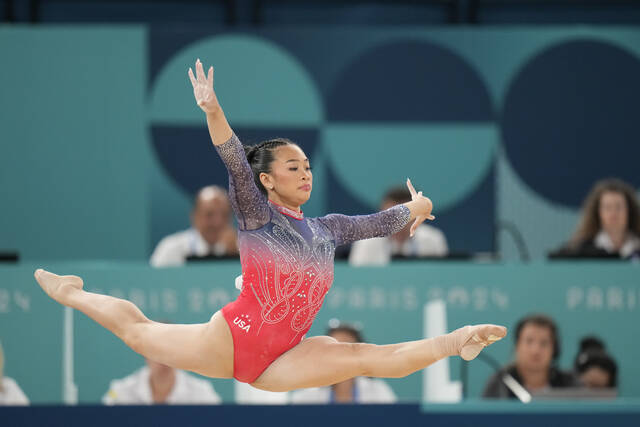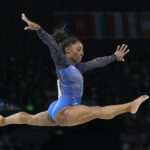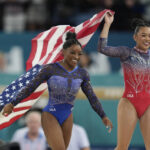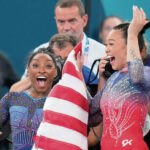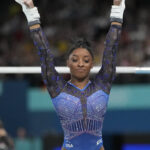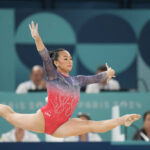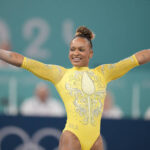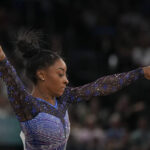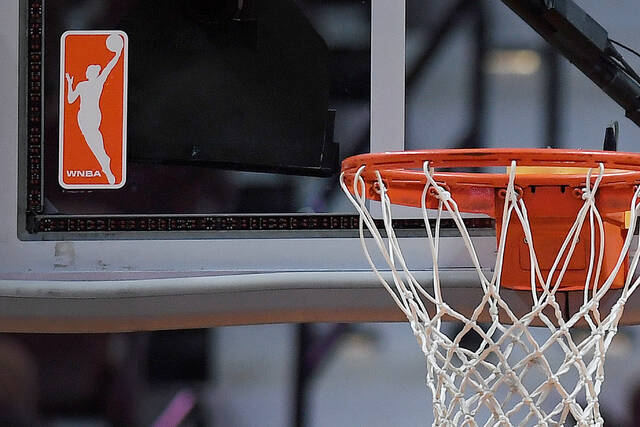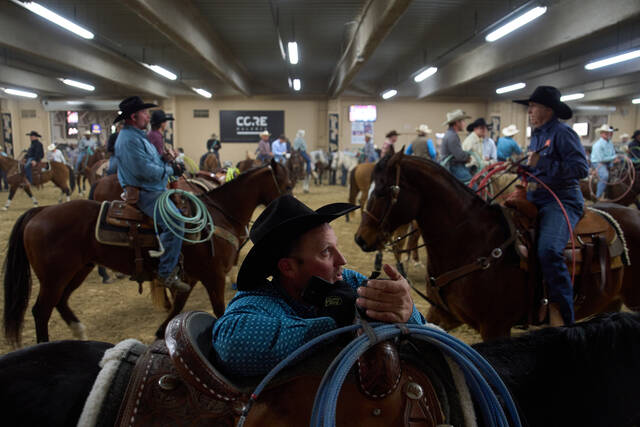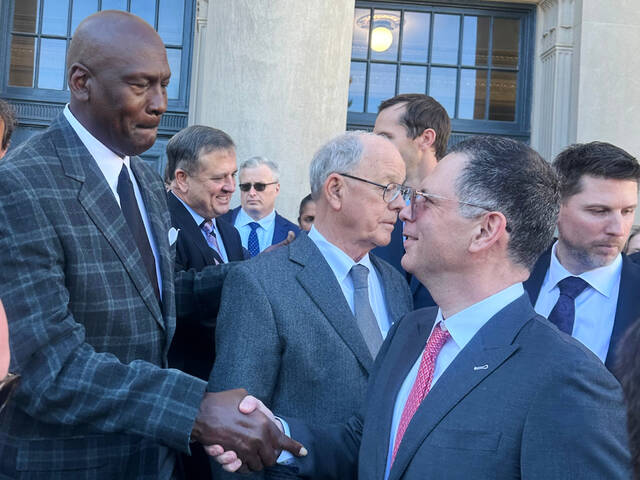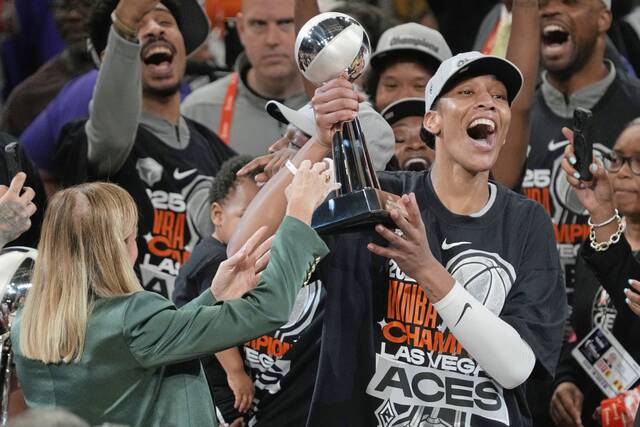PARIS — Simone Biles remains peerless. Even when she’s not quite perfect.
The American gymnastics star edged Brazil’s Rebeca Andrade during a tense Olympic all-around final Thursday. Biles’ total of 59.131 was just ahead of Andrade at 57.932, one of the closest calls Biles has endured at a major international event.
Sunisa Lee, the Tokyo Olympics champion, earned bronze despite spending much of the last 15 months dealing with multiple kidney diseases that left her return to the Games in doubt.
Still, the meet ended just like all the ones Biles has started and finished over the last 11 years: with hugs and gold on the way.
And a silver goat chain — along with a gold medal — around the Greatest of All Time’s neck.
“It is crazy that I am in the conversation of ‘Greatest of all athletes’ because I just still think, ‘I’m Simone Biles from Spring, Texas who loves to flip,’ ” she said.
The margin was the smallest in a major international event since Biles captured the third of her record six world championships in 2015.
She was a teenager then. She’s an icon now.
The 27-year-old who is redefining what a gymnast can do — and just as notably, for how long she can do it — became the third woman to become a two-time Olympic champion, joining Larisa Latynina of the Soviet Union in 1956 and 1960 and Vera Caslavska of Czechoslovakia in 1964 and 1968.
Biles also is the oldest woman to win the biggest title in her sport since then 30-year-old Maria Gorokhovskaya of the Soviet Union won the first Olympic all-around in Melbourne in 1952.
Yet the sixth gold and ninth overall medal — the same as Romanian great Nadia Comaneci, who was among the star-studded crowd — of Biles’ unparalleled career did not come as easy as so many that came before.
She misjudged a transition on uneven bars, the weakest of her four events, letting go of the upper bar too soon and forcing her to reach for a larger-than-expect gap.
While she didn’t fall — Biles muscled her way back into the routine — it blunted her momentum and led to major deductions that left her trailing Andrade through two rotations.
The deficit didn’t last.
Biles responded with a largely wobble-free 14.566 on the balance beam, the highest of the night among the 24 finalists, and Andrade was forced to do a major balance check during her slightly easier set that dropped her to second heading into floor exercise, Biles’ signature event.
Andrade, the silver medalist behind Lee in 2021, needed the best floor set of her life to catch Biles. It didn’t quite happen. Andrade stepped out of bounds at one point, a minor problem but enough to create plenty of wiggle room for Biles.
“I don’t want to compete with Rebeca no more,” Biles said. “I’m tired. Like, she’s way too close. I’ve never had an athlete that close.”
After the final score was announced, Biles and Lee — both Olympic champions — bolted onto the floor, waving an American flag. Lee, the Tokyo winner with Biles sidelined, is the first to win gold in all-around one Games then earn another medal in the next since Comaneci in 1976 and ’80.
“I just wanted to prove to myself that I could do it because I didn’t think that I could,” Lee said.
While there might be more medals on the way — Biles is in three event finals later in the Games — the all-around puts her into the conversation as perhaps the greatest American Olympian ever.
Biles is no longer the prodigy who triumphed in Rio de Janeiro eight years ago.
She’s married and a vocal advocate for survivors of sexual abuse and the importance of proper mental health. She openly volunteered after the Americans won gold in the team final Tuesday that she met with her personal therapist that morning to help get her in the right mindset.
Biles relied on the internal work she has done over the years after that rocky bars routine. She sat with her legs crossed on a chair in her blue sequined leotard and closed her eyes, immune to the cameras that followed her every move.
When she opened them, she was ready to move on.
It’s what she does. She has said repeatedly over the last three years that what happened in Tokyo is a part of her past, not a part of her present, and if critics have a problem with it, that’s their issue, not hers.
She has moved on to bigger things. Like setting a standard that might never be reached.
In her sport. And maybe all others, too.



